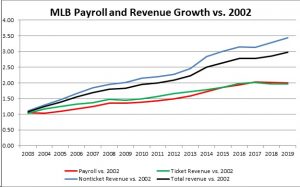TODAY: The automatic runner rule in extra innings might be modified rather than removed, USA Today’s Bob Nightengale writes. The rule could be altered so that the auto runner wouldn’t become part of the game until the 11th or 12th inning, with the first extra frame or two played until regular rules.
JULY 13: “I don’t think seven-inning doubleheaders are going to be part of our future going forward,” MLB Commissioner Rob Manfred told reporters (including ESPN.com’s Jeff Passan and MLB.com’s Mark Feinsand) today. Additionally, Manfred also suggested that the league could do away with the modified extra-innings rule that saw a runner automatically placed on second base at the start of each extra frame.
JULY 11: As part of the MLB – MLBPA agreements on health and safety protocols, doubleheaders have consisted of a pair of seven-inning games over the past two years. “Barring heavy resistance” from the Players Association, the league is planning to return to the traditional nine-inning affairs for twin bills starting in 2022, reports Bob Nightengale of USA Today.
It’s not clear how hard the MLBPA would need to push back against the return of nine-inning doubleheaders for the league to agree to keep the seven-inning format in place, nor is it even apparent there’s much interest on the players’ side in doing so. The seven-inning doubleheader format has been in place the last two seasons as a COVID-19 mitigation measure. With viral spread among teams contributing to the cancellation of games in bulk (especially last season, before the availability of vaccines), a few teams had to play a series of doubleheaders in relatively rapid succession. Fear of overworking players — particularly on the pitching staff — led the parties to knock two frames off games during doubleheaders. The hope and expectation is certainly that COVID-19 mitigation efforts won’t need to be as prevalent next year.
Concern about overexerting pitching staffs is also a reason for another COVID-inspired rules change of 2020-21: the automatic runner in extra innings. There’s been no indication of MLB’s plans with regards to that alteration beyond this season. (Notably, that rule was put into place throughout the minor leagues in 2018, well before the pandemic).
There’s little doubt the rule has indeed served its purpose of preventing marathon games. There hasn’t been a single MLB game to exceed thirteen innings in either of the past two seasons; there were 23 such games in 2019 alone. Nevertheless, the rule has predictably proven divisive among fans, many of whom perceive the placement of a free runner on second base to start extras as gimmicky.
Of course, any rules discussions will take place amidst broader negotiations between MLB and the MLPA on the state of the game. The collective bargaining agreement is scheduled to expire December 1, setting the stage for a new round of CBA talks in the coming months.

